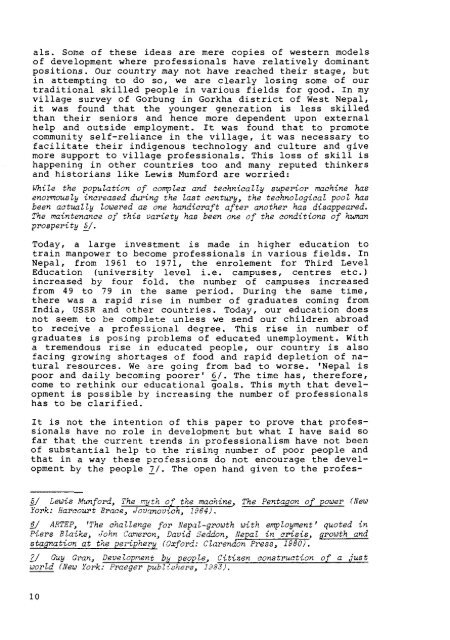Ifda dossier 47, May/June 1985
Ifda dossier 47, May/June 1985
Ifda dossier 47, May/June 1985
You also want an ePaper? Increase the reach of your titles
YUMPU automatically turns print PDFs into web optimized ePapers that Google loves.
als. Some of these ideas are mere copies of western models<br />
of development where professionals have relatively dominant<br />
positions. Our country may not have reached their stage, but<br />
in attempting to do so, we are clearly losing some of our<br />
traditional skilled people in various fields for good. In my<br />
village survey of Gorbung in Gorkha district of West Nepal,<br />
it was found that the younger generation is less skilled<br />
than their seniors and hence more dependent upon external<br />
help and outside employment. It was found that to promote<br />
community self-reliance in the village, it was necessary to<br />
facilitate their indigenous technology and culture and give<br />
more support to village professionals. This loss of skill is<br />
happening in other countries too and many reputed thinkers<br />
and historians like Lewis Mumford are worried:<br />
While the population of complex and technically superior machine has<br />
enormously increased during the last century, the technological pool has<br />
been actualZy lowered as one handicraft after another has disappeared.<br />
The maintenance of this variety has been one of the conditions of human<br />
prosperity 5/.<br />
Today, a large investment is made in higher education to<br />
train manpower to become professionals in various fields. In<br />
Nepal, from 1961 to 1971, the enrolement for Third Level<br />
Education (university level i.e. campuses, centres etc.)<br />
increased by four fold. the number of campuses increased<br />
from 49 to 79 in the same period. During the same time,<br />
there was a rapid rise in number of graduates coming from<br />
India, USSR and other countries. Today, our education does<br />
not seem to be complete unless we send our children abroad<br />
to receive a professional degree. This rise in number of<br />
graduates is posing problems of educated unemployment. With<br />
a tremendous rise in educated people, our country is also<br />
facing growing shortages of food and rapid depletion of na-<br />
tural resources. We are going from bad to worse. 'Nepal is<br />
poor and daily becoming poorer' g /. The time has, therefore,<br />
come to rethink our educational goals. This myth that devel-<br />
opment is possible by increasing the number of professionals<br />
has to be clarified.<br />
It is not the intention of this paper to prove that profes-<br />
sionals have no role in development but what I have said so<br />
far that the current trends in professionalism have not been<br />
of substantial help to the rising number of poor people and<br />
that in a way these professions do not encourage the devel-<br />
opment by the people 21. The open hand given to the profes-<br />
5J Lewis Mmford, The myth of the machine, The Pentagon of power (New<br />
York: Harcowt Brace, Jovanovich, 1964).<br />
6J ARTEP, 'The challenge for Nepal-growth with employment' quoted in<br />
Piers BZaike, John Cameron, David Seddon, Sepal in crisis, growth and<br />
stagnation at the periphery (Oxford: Clarendon Press, 1980).<br />
7J Guy Gran, Development by people. Citizen construction of a just<br />
world (flew York: Praeqer publishers, 1983).
















